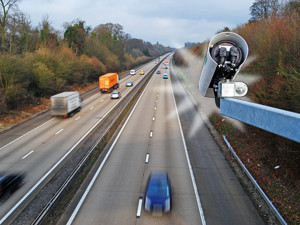
Cape Town's law enforcement will receive a boost with an investment of R14 million in automatic number plate recognition (ANPR) technology in the coming months.
This is according to the city's Safety and Security Directorate, which says the funds will be used to retrofit existing CCTV cameras with the technology and to install similar technology in law enforcement vans.
The City of Cape Town's Safety and Security Directorate includes the metro police, traffic, law enforcement, fire and emergency rescue services, disaster risk management and the public emergency call centre.
The city's mayoral committee member for safety and security, alderman JP Smith, says the investment in ANPR technology is part of the city's drive towards a more intelligence-driven policing approach.
"Residents are constantly calling for more visible policing, but I dare say invisible policing is the way of the future. This technology, plus what is to come in the years ahead, is a powerful force multiplier for law enforcement in that it provides real-time alerts. This greatly strengthens our investigative capabilities by providing data and information that would otherwise have gone undetected," he says.
A way of the future
ANPR is a technology that uses optical character recognition on images to read vehicle registration plates. ANPR is used by police services around the world for law enforcement purposes.
It can also be used for electronic toll collection on pay-per-use roads as well as a way of monitoring the movement of traffic by highway agencies.
According to the Safety and Security Directorate, it was able to secure R14 million for the ANPR technology in the annual adjustments budget.
The funding will be used to retrofit existing CCTV cameras with ANPR technology and to install similar technology in city enforcement services vehicles.
Approximately 100 CCTV cameras will be retrofitted with ANPR capabilities.
In terms of the current R14 million investment in ANPR technology, the city will spend R8 million on ANPR hardware for vehicle installations and a further R6 million for static installations alongside existing metro police-operated CCTV cameras.
Requests for additional funding will be submitted for the 2016/17 budget to extend the static and mobile rollout, according to the city.
Systems in place
While the performance of the technology systems of the South African Police Services has often been criticised, Cape Town's Safety and Security Directorate says it first started experimenting with ANPR technology in 2010.
Currently, five traffic vehicles have such installations. The technology is also used at roadblocks where an ANPR camera is mounted on a tripod. The bus and minibus-taxi lane and average speed over distance camera systems also make use of ANPR technology.
The cameras have been used as part of operation reclaim and are programmed to identify outstanding warrants of arrest on a particular number plate, whether a motor vehicle has been suspended, has mismatched number plates (plates that do not belong to that particular vehicle), unlicensed vehicles and stolen vehicles, says the City of Cape Town.
"CCTV footage has already proven its worth in the fight against crime as it helps law enforcement agencies to respond immediately to incidents. It also assists with mapping crime hotspots, which can then influence deployment patterns.
"The number plate recognition technology is the latest layer that we're adding to our arsenal. Who knows what technology will come next. As the largest public surveillance agency on the continent, the city will definitely be in line to get involved," adds Smith.
Share